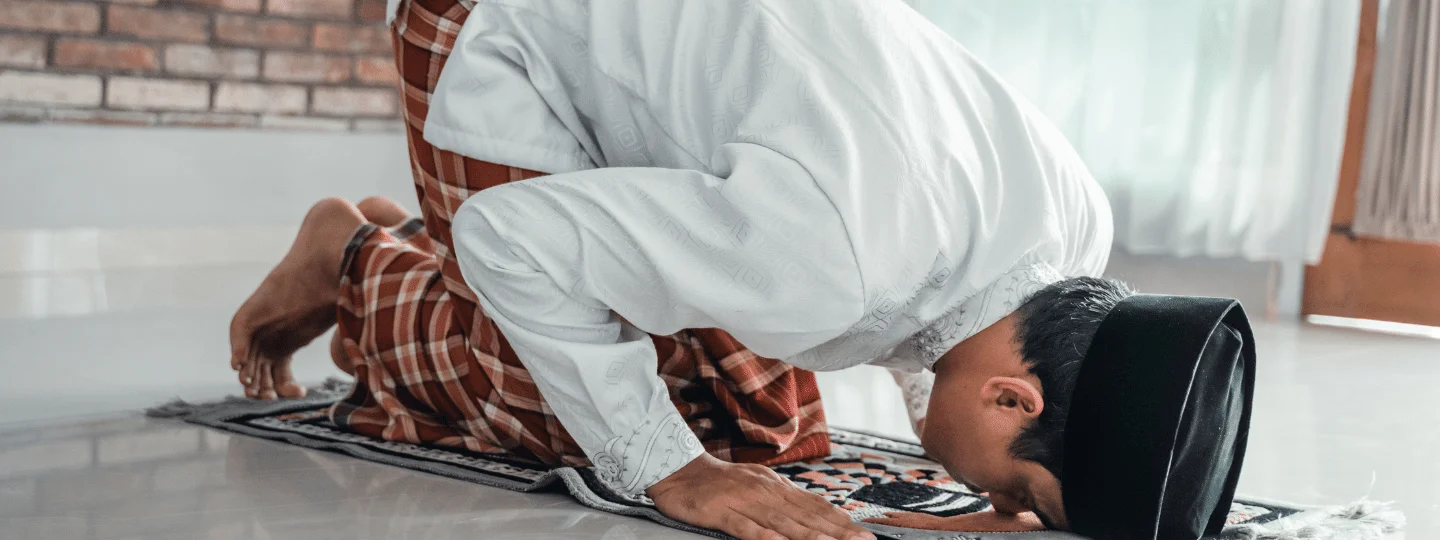Is there a basis for the special prayers mentioned during the month of Rajab (Salat al-Raghaib)?
Quran
Hadith
Islamic Text
These special prayers (Salat al-Raghaib) in Rajab have been considered Bid’ah by leading scholars of Ahl Sunnah, like Imam al-Nawawi, Imam Ibn Abideen and Imam Ibn Nujaym. This is the general rule, but specific prayers need to be considered on their own evidential merit.
عَنْ أَبِي هُرَيْرَةَ قَالَ: قَالَ رَسُولُ اللهِ صَلَّى اللهُ عَلَيْهِ وَسَلَّمَ: كَفَى بِالْمَرْءِ كَذِبًا أَنْ يُحَدِّثَ بِكُلِّ مَا سَمِعَ
(Sayidina) Abu Hurairah (May Allah Most High be pleased with him) said that the Prophet ﷺ said: ‘It is enough of a lie for a person to narrate everything that he hears.’ (Sahih Muslim, Chapter 3, Prohibition of Narrating Everything One Hears).
Many of the great Imams of Ahl Sunnah have warned against specific acts of worship being promoted in the month of Rajab. Imam Ibn Hajr al-Asqalani made a broad statement regarding this issue:
لم يرد في فضل شهر رجب، ولا في صيامه، ولا في صيام شيء منه، – معين، ولا في قيام ليلة مخصوصة فيه – حديث صحيح يصلح للحجة
No sound Hadith, which can be used as evidence has been narrated regarding the virtue of Rajab, neither in fasting it, nor fasting a part of it specifically, nor in praying at night during it, which is specific to it. (Imam Ibn Hajr al-Asqalani, Tabyeen al-Ajab).
Other scholars spoke more specifically about Salat al-Raghaib. They considered it an innovation (Bid’ah) and warned against it. It is important to understand that such statements are not condemning Nafl prayer in the month of Rajab, rather Nafl prayer is always recommended (except during Makruh times). However, these statements (Nusoos) are condemning attributing specific virtue to specified times without Hadith evidence.
الصَّلَاةُ الْمَعْرُوفَةُ بصلاة الرغائب وهي ثنتى عَشْرَةَ رَكْعَةً تُصَلَّى بَيْنَ الْمَغْرِبِ وَالْعِشَاءِ لَيْلَةَ أَوَّلِ جُمُعَةٍ فِي رَجَبٍ وَصَلَاةُ لَيْلَةِ نِصْفِ شَعْبَانَ مِائَةُ رَكْعَةٍ وَهَاتَانِ الصَّلَاتَانِ بِدْعَتَانِ وَمُنْكَرَانِ قَبِيحَتَانِ وَلَا يُغْتَرُّ بِذَكَرِهِمَا فِي كِتَابِ قُوتِ الْقُلُوبِ وَإِحْيَاءِ عُلُومِ الدِّينِ وَلَا بِالْحَدِيثِ الْمَذْكُورِ فِيهِمَا فَإِنَّ كُلَّ ذَلِكَ بَاطِلٌ وَلَا يُغْتَرُّ بِبَعْضِ مَنْ اشْتَبَهَ عَلَيْهِ حُكْمُهُمَا مِنْ الْأَئِمَّةِ فَصَنَّفَ وَرَقَاتٍ فِي اسْتِحْبَابِهِمَا فَإِنَّهُ غَالِطٌ فِي ذَلِكَ وَقَدْ صَنَّفَ الشَّيْخُ الْإِمَامُ أَبُو مُحَمَّدٍ عبد الرحمن بن اسمعيل الْمَقْدِسِيُّ كِتَابًا نَفِيسًا فِي إبْطَالِهِمَا فَأَحْسَنَ فِيهِ وَأَجَادَ رَحِمَهُ اللَّهُ
The prayer known as Salat al-Raghaib, is twelve Rakahs between Maghrib and Isha on the first Friday night of Rajab, and one hundred Rakahs on the night of the middle of Sha’baan. Both of these are vile, abhorrent innovations (Bid’ahs). One should not be deceived by the fact that they are mentioned in the books, Qoot al-Quloob or Ihyaa Uloom al-Deen. Nor by the Hadith that is mentioned regarding them, because it is baseless (Batil). Likewise one should not be misled by someone (a scholar) from the Imams, who was mistaken regarding their legal ruling so wrote a treatise encouraging them, for indeed he was mistaken regarding the matter. The Imam, Shaykh Abu Muhammad Abd al-Rahman bin Ismaeel al-Maqdisi wrote an esteemed book clarifying their invalidity, and he done well and excelled, may Allah (Most High) have mercy upon him. (Imam al-Nawawi, al-Majmoo’).
The main issue alluded to by Imam al-Nawawi is the fact that the Hadith narrations used to support these practices are baseless. This was explicitly mentioned by other scholars.
مَطْلَبٌ فِي صَلَاةِ الرَّغَائِبِ
قَالَ فِي الْبَحْرِ: وَمِنْ هُنَا يُعْلَمُ كَرَاهَةُ الِاجْتِمَاعِ عَلَى صَلَاةِ الرَّغَائِبِ الَّتِي تُفْعَلُ فِي رَجَبٍ فِي أُولَى جُمُعَةٍ مِنْهُ وَأَنَّهَا بِدْعَةٌ، وَمَا يَحْتَالُهُ أَهْلُ الرُّومِ مِنْ نَذْرِهَا لِتَخْرُجَ عَنْ النَّفْلِ وَالْكَرَاهَةِ فَبَاطِلٌ اهـ
قُلْت: وَصَرَّحَ بِذَلِكَ فِي الْبَزَّازِيَّةِ كَمَا سَيَذْكُرُهُ الشَّارِحُ آخِرَ الْبَابِ، وَقَدْ بَسَطَ الْكَلَامَ عَلَيْهَا شَارِحَا الْمُنْيَةِ، وَصَرَّحَا بِأَنَّ مَا رُوِيَ فِيهَا بَاطِلٌ مَوْضُوعٌ، وَبَسَطَا الْكَلَامَ فِيهَا خُصُوصًا فِي الْحِلْيَةِ وَلِلْعَلَامَةِ نُورِ الدِّينِ الْمَقْدِسِيَّ فِيهَا تَصْنِيفٌ حَسَنٌ سَمَّاهُ رَدْعُ الرَّاغِبِ، عَنْ صَلَاةِ الرَّغَائِبِ، أَحَاطَ فِيهِ بِغَالِبِ كَلَامِ الْمُتَقَدِّمِينَ وَالْمُتَأَخِّرِينَ مِنْ عُلَمَاءِ الْمَذَاهِبِ الْأَرْبَعَةِ. (رد المحتار على الدر المختار)
An analysis of Salat al-Raghaib:
He (Imam Ibn Nujaym) said in al-Bahr: ‘From this, it is known that gathering for Salat al-Raghaaib that is practiced on the first Jum’ah of Rajab is disliked (Makruh) and indeed it is a blameworthy innovation. The stratagem used by the people of Rum (Anatolia), where they make a vow to remove it from the status of Nafl (to Waajib) and thus from being disliked, is null and void.
I (Ibn Abideen) say: He was explicit regarding this in al-Bazaziyyah as the commentator (Imam al-Haskafi) will mention at the end of the chapter. The commentators of al-Munyah expounded upon it and clarified that the (Hadith) narrations used to support it (Salat al-Raghaib) are false and fabricated. In al-Hilyah he really did explain thoroughly. Allamah Noorud-Deen al-Maqdisi has an admirable work on this issue, he called it ‘Radd al-Raghaib an Salat al-Raghaib’, in which he encompassed, most of the statements of (both) the early and later scholars of the four schools of law. (Imam Ibn Abideen, Radd al-Muhtar ‘ala al-Durr al-Mukhtar).
These Nusoos should be treated as general statements. They should serve as a warning and must lead to us being even more cautious when we encounter Hadith speaking about worship in the month of Rajab. It is highly likely that such Hadith will be inauthentic attributions to the beloved Prophet ﷺ. However, every individual narration should be judged according to its own merits.
A person promoting a narration regarding the virtue of specific worship in the month of Rajab, must be asked to thoroughly reference it to an original book of Hadith and provide a classical reference for its authenticity (see link below for more details).
وَلِذَا مَنَعُوا عَنْ الِاجْتِمَاعِ لِصَلَاةِ الرَّغَائِبِ الَّتِي أَحْدَثَهَا بَعْضُ الْمُتَعَبِّدِينَ لِأَنَّهَا لَمْ تُؤْثَرْ عَلَى هَذِهِ الْكَيْفِيَّةِ فِي تِلْكَ اللَّيَالِي الْمَخْصُوصَةِ وَإِنْ كَانَتْ الصَّلَاةُ خَيْرَ مَوْضُوعٍ. (رد المحتار على الدر المختار)
Therefore, it is not permitted to gather for Salat al-Raghaib. Which was innovated by some of the worshippers. This is because it has not been narrated (in Hadith) with this specific description on those specific nights, even though prayer itself is amongst the best of actions. (Imam Ibn Abideen, Radd al-Muhtar ‘ala al-Durr al-Mukhtar).
(قَوْلُهُ فِي صَلَاةِ رَغَائِبَ) فِي حَاشِيَةِ الْأَشْبَاهِ لِلْحَمَوِيِّ: هِيَ الَّتِي فِي رَجَبٍ فِي أَوَّلِ لَيْلَةِ جُمُعَةٍ مِنْهُ. قَالَ ابْنُ الْحَاجِّ فِي الْمَدْخَلِ: وَقَدْ حَدَثَتْ بَعْدَ أَرْبَعَمِائَةٍ وَثَمَانِينَ مِنْ الْهِجْرَةِ، وَقَدْ صَنَّفَ الْعُلَمَاءُ كُتُبًا فِي إنْكَارِهَا وَذَمِّهَا وَتَسَفِّيهِ فَاعِلِهَا، وَلَا يُغْتَرَّ بِكَثْرَةِ الْفَاعِلِينَ لَهَا فِي كَثِيرٍ مِنْ الْأَمْصَارِ. (رد المحتار على الدر المختار)
In the Haashiyah of al-Ashbah by (Imam) al-Hamawi: It (Salat al-Raghaib) is to be prayed during the first Friday night of Rajab. Ibn al-Hajj said in his ‘al-Madkhal,’ It (Salat al-Ragha’ib) had been invented after four-hundred and eighty years after the Hijrah. Indeed the scholars compiled books on its disapproval and censure, they considered its performers to be foolish people. Do not be deceived by the abundance of its performers in many cities. (Imam Ibn Abideen, Radd al-Muhtar ‘ala al-Dar al-Mukhtar).
أول لَيْلَة جُمُعَة من شهر رَجَب، وَهِي لَيْلَة الرغائب الَّتِي أحدثت فِيهَا الصَّلَاة الْمَشْهُورَة، وَلَا أصل لَهَا. (عمدة القاري شرح صحيح البخاري)
The first Jum’ah (Friday) night in Rajab, and it is the night of Raghaaib in which the well-known prayer has been innovated, although it is baseless. (Imam Badr al-Deen al-Ayni, Umdatu al-Qari Sharh Sahih al-Bukhari).
Imam Ibn Nujaym (below) explained that using a stratagem to get away from the Bid’ah is not going to work. It is worth noting that the fact certain people were trying to use a stratagem to free themselves of the prohibition, is a recognition of the problematic nature of the practice. Legal stratagems are only used by people when there is a concern with regards to the permissibility of one’s action.
وَمِنْ هُنَا يُعْلَمُ كَرَاهَةَ الِاجْتِمَاعِ عَلَى صَلَاةِ الرَّغَائِبِ الَّتِي تُفْعَلُ فِي رَجَبٍ فِي أَوَّلِ لَيْلَةِ جُمُعَةٍ مِنْهُ وَأَنَّهَا بِدْعَةٌ وَمَا يَحْتَالُهُ أَهْلُ الرُّومِ مِنْ نَذْرِهَا لِتَخْرُجَ عَنْ النَّفْلِ وَالْكَرَاهَةِ فَبَاطِلٌ وَقَدْ أَوْضَحَهُ الْعَلَّامَةُ الْحَلَبِيُّ وَأَطَالَ فِيهِ إطَالَةً حَسَنَةً كَمَا هُوَ دَأْبُهُ وَفِي الْفَتَاوَى الْبَزَّازِيَّةِ. (البحر الرائق شرح كنز الدقائق)
From this, it is known that gathering for Salat al-Raghaib that is practiced on the first Jum’ah of Rajab is disliked (Makruh) and indeed it is a blameworthy innovation. The stratagem used by the people of Rum (Anatolia), where they make a vow to remove it from the status of Nafl (to Waajib) and thus from being disliked, is null and void. Indeed al-Allamah al-Halabi has clarified this issue and expounded upon it thoroughly as was his practice, as well as in the Fatwa of al-Bazaziyyah. (Imam Ibn Nujaym, al-Bahr al-Ra’iq Sharh Kanz al-Daqa’iq).
Upon reflection it is clear that the scholars have an issue with holding beliefs regarding reward and virtue on these nights, because none of them would say it is wrong to worship during the night. Rather Nafl Salah is generally permitted. Encouraging prayer on a specific night in a specific manner, gives people the impression that particular virtue is attributed to it, and therein lies the concern.
The very fact that we have rulings like the above demonstrates the importance of studying the Deen. Otherwise a person may exert great effort in worship and think he is doing good, whereas in reality one is involved in something problematic. This is why many of the great scholars of Islamic spirituality have warned against ignorance and encouraged knowledge.
And Allah Most High Knows Best.
– Answered by Shaykh Noorud-deen Rashid (03.02.2022)
-Special thanks to Sidi Yusuf Asghar for assisting with Nusoos translation.
See also:
Are all Hadith about the virtue of Rajab fabricated?
Fasting one day in Rajab is like fasting a hundred years?
Hadith “seeking knowledge is an obligation upon every Muslim.”
See also video:






